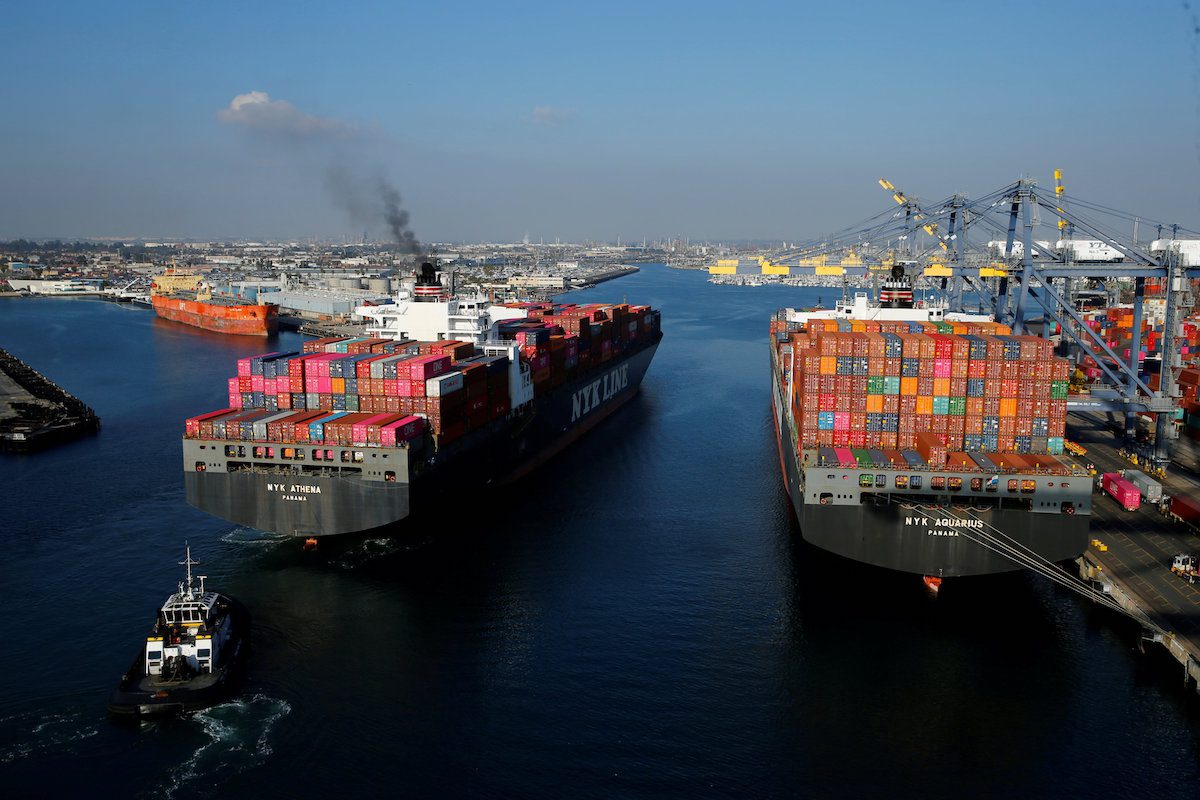FILE PHOTO: A container ship arrives at Yusen Terminals (YTI) on Terminal Island at the Port of Los Angeles in Los Angeles, California, U.S., January 30, 2019. REUTERS/Mike Blake/File Photo
 By Lisa Baertlein and Matthias Inverardi LOS ANGELES/DUSSELDORF, April 2 (Reuters) – The volume of U.S. ocean cargo imports arranged by Deutsche Post’s DHL Group, United Parcel Service Inc, FedEx Corp and other freight forwarders fell sharply in February, sending a warning on global trade, a key barometer for the world economy.
By Lisa Baertlein and Matthias Inverardi LOS ANGELES/DUSSELDORF, April 2 (Reuters) – The volume of U.S. ocean cargo imports arranged by Deutsche Post’s DHL Group, United Parcel Service Inc, FedEx Corp and other freight forwarders fell sharply in February, sending a warning on global trade, a key barometer for the world economy.
Though just a sliver of the global delivery and logistics business, freight forwarding – the arranging of end-to-end transport of goods for importers and exporters – is seen as a proxy for international trade.
Towards the end of last year their clients binged on imports such as apparel, auto parts, chemicals and furniture to avoid U.S. President Donald Trump’s tariffs on Chinese goods.
In February, those customers pulled back. U.S. ocean imports fell 4.5 percent, the first drop in two years, according to S&P Global Market Intelligence’s trade data firm Panjiva.
Freight forwarders’ overall February decline was in near lockstep, down 4.4 percent, according to Panjiva data, published first by Reuters.
Customers – grappling with stockpiled goods and delays on a new round of planned tariff increases – eased off buying, exacerbating a normal slowdown due to Chinese New Year factory closures.
Switzerland’s Kuehne und Nagel, which is the largest ocean cargo freight forwarder, saw its U.S. import volume fall 9.3 percent in February. Volume for DHL, the second largest, was down 8.6 percent.
UPS volume dropped 16.3 percent and FedEx, which twice in three months has warned about cooling global trade, saw its volume fall 14.6 percent.
The companies mentioned declined to comment on Panjiva’s data.
Overall U.S. imports from China fell 9.9 percent in February, driving most of the monthly decline for freight forwarders.
Some experts said the retreat was the inevitable outcome of a bitter trade war between the world’s biggest economic powerhouses.
“I’m not seeing these declines as anything alarming yet,” said Stifel analyst David Ross, who is awaiting March results, due later this month.
But Panjiva research analyst Chris Rogers said data suggests that a widespread and accelerating trade slowdown is under way, with Europe, South Korea and Japan contributing.
The 4.6 percent fall in European imports in February, including car parts and furniture, could point to a “softer consumer spending picture than many expect,” Rogers said.
DHL’s Global Trade Barometer, which tracks three-quarters of all ocean and air freight, last week forecast that growth would continue to lose momentum. Among other things, U.S. imports of consumer fashion goods and industrial raw materials are expected to contract slightly for the next three months, DHL said in a statement.
“The outlook for the rest of 2019 doesn’t look great,” said supply chain consultant John Haber, who thinks tariff-related stockpiling masked softening U.S. demand.
(Reporting by Lisa Baertlein in Los Angeles and Matthias Inverardi in Dusseldorf Editing by Phil Berlowitz)
(c) Copyright Thomson Reuters 2019.

 Join The Club
Join The Club











